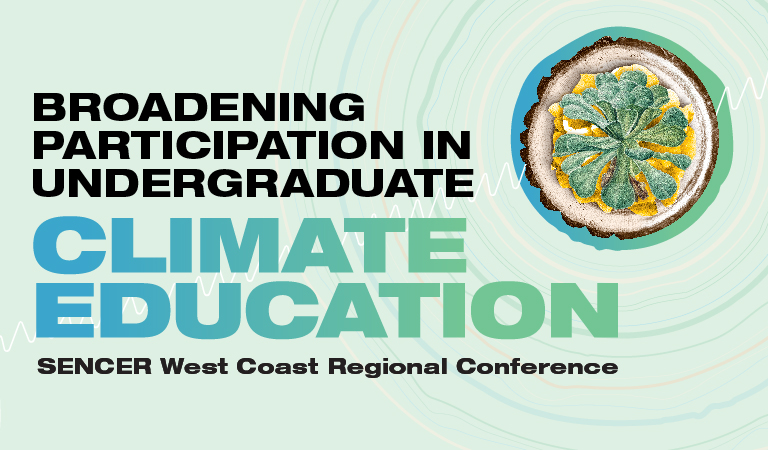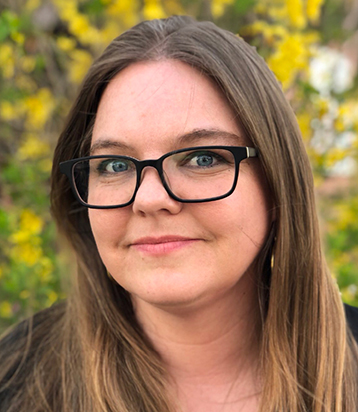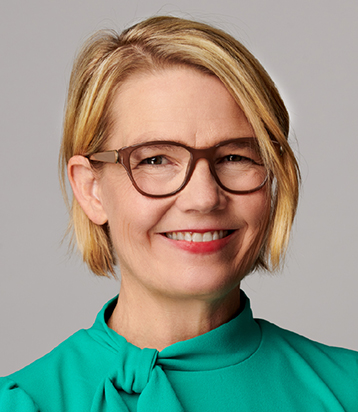Broadening Participation in Undergraduate Climate Education

SENCER West Coast Regional Meeting, Sept. 18–19, 2025
Sponsored by The Hixon Center for Climate and the Environment and the Office of Community and Civic Engagement
The world is on track for at least a 2℃ global average temperature increase by 2100 based on international agreements, pledges, and targets—and even optimistic scenarios of current pledges result in an estimated 1.8℃ of warming, all despite the 2015 Paris agreement goal of keeping the global average temperature increase below 1.5℃. The UN Intergovernmental Panel on Climate Change has released their sixth Assessment Report describing the impacts of warming beyond 1.5℃, which will touch every aspect of our lives. And yet K-12 education is only just beginning to adopt climate literacy into its standard curricula, and the inclusion of climate change in higher education, through core curricula, is lagging.
Despite these shortcomings, there is a growing effort to expand climate education in higher education and to incorporate climate beyond the earth sciences. Faculty understand that, regardless of field, our graduates will inherit a personal and professional landscape that is fundamentally changed from the world today. Their education should prepare them for this new world.
This one and a half-day conference will convene climate experts, teacher-scholars from other disciplines, and community partners to discuss the future of climate education for undergraduates. The goal of the conference is to expand the number of faculty involved in climate education and for those already involved to deepen their understanding of and appreciation for the strengths that multiple perspectives bring to addressing the challenges of climate. A theme throughout the conference will be broadening participation in climate education on our campuses and in our communities. Find our more information on our 2023 conference.
Who should present?
We invite presentations describing any form of undergraduate climate education, from entire courses to assignments, in any discipline, on any topic related to climate change.
Conference Keynote Speakers and Facilitators

Katie Worth
Journalist
Censoring the Future: How Climate Change is Taught in America
Katie Worth tells investigative and enterprise stories about science, politics and their myriad intersections. She began her career as a beat reporter at the Pacific Daily News on Guam, and later worked as an enterprise reporter for the San Francisco Examiner. Her work has appeared in Scientific American, This American Life, the Washington Post, the Guardian, National Geographic, Slate, Vice, The Wall Street Journal, the Marshall Project, the Trace and The Best American Science and Nature Writing anthology.
Worth joined the Boston-based FRONTLINE team in 2015 and for the next six years worked on special investigative projects for the series, leading reporting endeavors in print, film, interactive media, audio and virtual reality. She held leadership roles in both FRONTLINE and WGBH’s diversity, equity and inclusion committees, efforts she considers essential to the future of journalism. She is currently a climate reporter at ProPublica.
She is the author of the book Miseducation: How Climate Change is Taught in America, published in November 2021.

K. Wayne Yang, PhD
Provost, Muir College, University of California San DiegoDirector, Environmental Studies Program, University of California San Diego
Why Climate Change Education?
K. Wayne Yang leads Muir College and directs the Environmental Studies program at UC San Diego. He co-founded the Indigenous Futures Institute and Black Like Water, scholarly-scientific-cultural+beyond communities dedicated to restoring good relationships with the more-than-human world. Additionally, he co-chaired the Academic Senate workgroup that created the Jane Teranes Climate Change Education Requirement.
He often writes with Indigenous Unangax̂ scholar Eve Tuck, James Weldon Johnson Professor and founding director of the Provostial Center for Indigenous Studies at NYU. Together, they edit the book series Indigenous and Decolonizing Studies in Education with Routledge Press. Furthermore, they convene the Land Relationships Super Collective, which supports various participatory action research projects with community organizations engaged in land-based projects.

Krista Hiser, PhD
Professor, Kapi’olani Community College, University of Hawaii System
Dr. Hiser will facilitate “Climate Futures & Humanity’s Great Transition” for interested participants. This transformative activity creates conditions for participants to reflect on their roles and responsibilities to themselves, each other and our places, in light of accelerating ecological breakdown and social tension. Participants will have a facilitated interaction with a physical timeline interpreting potential climate future scenarios, with opportunity for open, honest reflection with peers. This activity draws from the work of Sandy Wiggins and futurist Duane Elgin.
Dr. Hiser is the Senior Lead and Advisor for advancing Sustainability Education and the Key Competencies Framework. In her role she works with partners at Arizona State University, and GCSE’s Sustainability Education Community of Practice, as well as stakeholders across higher education. She has been Senior Fellow for Community Colleges at GCSE since 2018. Formerly the director of the University of Hawaiʻi System Center for Sustainability Across the Curriculum, she is on professional leave from Kapiʻolani Community College, where she is a Professor of Composition & Rhetoric with an emphasis on sustainability curriculum, climate change education, and community resilience. She received her doctoral degree in Educational Administration from the University of Hawaii at Mānoa, and holds a master’s degree in English Composition from San Francisco State University and a bachelor’s in English from the University of Iowa.
At-a-Glance Schedule
Events will take place at either the R. Michael Shanahan Center for Teaching and Learning or the Platt Campus Center. Please use our Campus Map to help you locate the activities.
Thurs. Sept. 18, 2025
4 p.m. Check-in and reception (Sprague patio, adjacent to Shanahan 1430)
5–6:15 p.m. Keynote Speaker Katie Worth, Censoring the Future: How Climate Change is Taught in America (Shanahan 1430)
Fri. Sept 19, 2025
7:30–8:30 a.m. Coffee and continental breakfast (Sprague patio, adjacent to Shanahan 1430)
8:30–9:10 a.m. Keynote Speaker K. Wayne Yang, Why Climate Change Education? (Shanahan 1430)
9:15–10:45 a.m. Session A Institutional Endeavors – oral presentations (Shanahan 1430)
11:00 a.m–noon Poster presentations (Platt Campus Center)
Noon–12:45 p.m. Lunch (catered, buffet style, Platt Campus Center Green Room)
1:15–2:45 p.m. Session B Truth Mandala, led by Dr. Krista Hiser (limit 20, Shan 3460 Sky Cube)
1:15–2:45 p.m. Session C Humanities, Social Sciences, and the Arts -oral presentations (Shan 1430)
Coffee break
3–4:30 p.m. Session D Climate Futures Activity, led by Dr. Krista Hiser (limit 20, Shan 3460 Sky Cube)
3–4:30 p.m. Session E Civic and Community Engagement – (oral presentations, Shan 1430)
4:30–5 p.m. Closing reception (Sprague patio adjacent to Shan 1430)
Participants are encouraged to arrive Thursday afternoon and depart either Friday night, or to enjoy the weekend in Southern California.
Presenter Information
Oral presentations should be limited to 15 minutes inclusive of questions unless otherwise communicated. We ask that oral presenters provide a copy of their slides by Thursday Sept 18 so our technology support staff will have time to load the presentations to a shared computer and test them.
Poster presenters will have a poster board with pinnable area of 47” (width) by 66” (length).
Travel and Lodging
We have arranged a discounted block of rooms at the DoubleTree hotel, located at 555 W. Foothill Blvd., only 0.8 miles from the R. Michael Shanahan Center for Teaching and Learning. Please use our DoubleTree group booking link to access the discounted room rate, available until August 29, 2025. The hotel provides complimentary overnight parking.
Contact Details
For more information, please reach out to the organizers at climateeducation-l@g.hmc.edu. Conference organizers are Lelia Hawkins, director of the Hixon Center for Climate and the Environment; and Gabriela Gamiz, director of civic and community engagement.
Meet the Climate Education Conference Co-Sponsors
Harvey Mudd College’s Hixon Center for Climate and the Environment
The Hixon Center for Climate and the Environment is the home for all campus efforts related to climate, sustainability, and environmental studies, including course development, faculty-led scholarship, and special events.
To address the multifaceted challenges presented by our changing climate, the center is actively recruiting faculty for joint appointments across all departments. This will ensure our program is reflective of the interdisciplinary nature of the climate crisis. Regardless of a student’s aligned discipline, they will find an avenue to apply their passion and make an impact on society.
Read and learn more about the Hixon Center.
Harvey Mudd College’s Office of Civic and Community Engagement
The Office of Civic and Community Engagement (OCCE) works collectively with our campus and the broader community to educate and empower one another to be informed and engaged members of a community that makes meaningful contributions to society.
OCCE encourages the campus community to develop mutually meaningful and reciprocally enriching relationships with communities both locally and globally. OCCE achieves this by supporting students, faculty and staff with advice and guidance; community partnership communication; logistical and transportation resources; and funding for projects and (co)-curricular (re)design.
Read and learn more about OCCE.
National Center for Science & Civic Engagement’s (NCSCE’s) Science Education for New Civic Engagement and Responsibilities (SENCER)
NCSCE is a national organization that supports a community of educators throughout the STEM learning ecosystem, from K-12 and undergraduate education, to “free-choice” and informal education. Through professional development programs they support cross-sector collaboration, curriculum and course design, assessment, research, and mentoring. They help educators in and outside the classroom make connections between the content they teach and real world issues of civic importance. Their goal is to empower learners by showing them that STEM education is civic education; and what we learn today can help solve some of the biggest problems of tomorrow. Read and learn more about NCSCE.
SENCER is NCSCE’s signature program. SENCER courses and programs strengthen student learning and interest in science, technology, engineering, and mathematics (STEM) by connecting course topics to issues of critical local, national, and global importance.
Students and faculty report that the SENCER approach makes science more real, accessible, “useful,” and civically important. For history, resources, the SENCER Course Model Series, and lots more go to SENCER.net.
The 2025 Conference on Broadening Participation in Undergraduate Climate Education is supported in part by a generous gift from Thomas Bleakney, Class of 1969.
Conference Information
- The call for proposals has closed. We may still accept poster presentations. Contact the organizers for information.
- Registration: Closed
If you’re still interested in attending, please email our staff: climateeducation-l@g.hmc.edu. We may still be able to accommodate your registration. - Request modest travel assistance